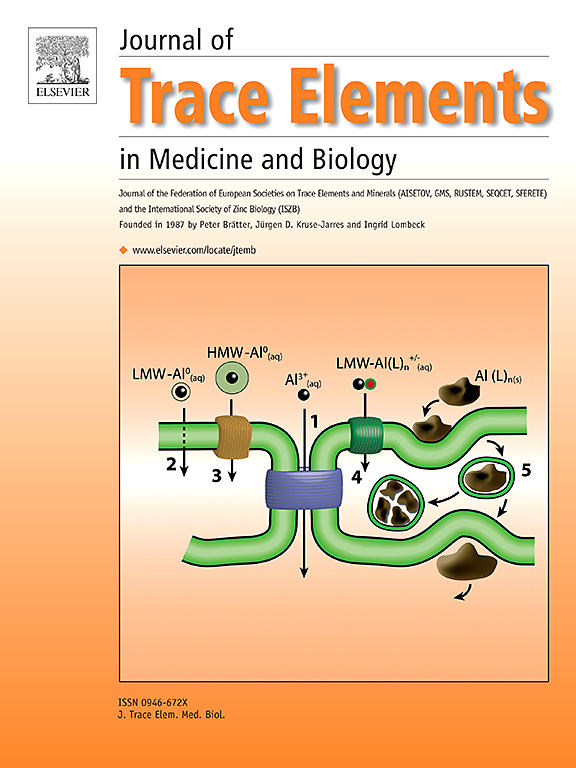A review on manganese and its effect on health and distribution in selected African countries
IF 3.6
3区 医学
Q2 BIOCHEMISTRY & MOLECULAR BIOLOGY
Journal of Trace Elements in Medicine and Biology
Pub Date : 2025-07-26
DOI:10.1016/j.jtemb.2025.127707
引用次数: 0
Abstract
Manganese (Mn), an essential trace element, is important in various biochemical and physiological processes such as proper growth and development, digestion, immune response, energy metabolism, homeostasis, reproduction, and defense against oxidative stress through the enzyme manganese superoxide dismutase (MnSOD) in mitochondria of body cells. This review highlights the biological role and effects of manganese on human health as well as health condition associated with manganese. Furthermore, it discusses Mn distribution among people in Nigeria, Ghana and Egypt taking into cognizant the Mn status of food with a view of assessing their health status with respect to Mn. A daily intake of Mn that is insufficient is linked to a number of negative health effects, including reduced fertility, impaired bone formation, generalized growth impairment, and altered lipid, protein and carbohydrate metabolism. However, there are proposed strategy to mitigate Mn induced neurotoxicity. This review reveals there is insufficient data on Mn content of food consumed, drinking water and daily manganese intake of individuals including children in African countries like Nigeria, Ghana and Egypt. Available data reveals most of the popularly consumed food analyzed contains sufficient quantity of Mn and may provide the recommended daily intake (RDI) if the food items are adequately combined in their diet in these regions. Therefore, it is important to emphasize the need to evaluate the Mn content of food consumed, drinking water and daily intake of Mn in Nigeria, Ghana and Egypt.
关于锰及其在某些非洲国家健康和分布的影响的综述
锰(Mn)是人体必需的微量元素,它通过细胞线粒体中的锰超氧化物歧化酶(MnSOD)参与人体的生长发育、消化、免疫反应、能量代谢、体内平衡、繁殖和抗氧化应激等生理生化过程。本文综述了锰的生物学作用和对人体健康的影响以及与锰相关的健康状况。此外,它讨论了尼日利亚、加纳和埃及人民的锰分布情况,同时认识到食物中的锰状况,以便评估他们在锰方面的健康状况。每日锰摄入量不足会对健康产生许多负面影响,包括生育力降低、骨形成受损、全身生长障碍以及脂质、蛋白质和碳水化合物代谢改变。然而,有建议的策略来减轻锰诱导的神经毒性。这项审查表明,在尼日利亚、加纳和埃及等非洲国家,关于食物、饮用水和个人(包括儿童)每日锰摄入量的数据不足。现有数据显示,在这些地区,大多数被分析的普遍食用的食物含有足量的锰,如果这些食物在饮食中适当组合,可能会提供推荐的每日摄入量(RDI)。因此,有必要强调对尼日利亚、加纳和埃及所食用的食物、饮用水和每日锰摄入量进行评估。
本文章由计算机程序翻译,如有差异,请以英文原文为准。
求助全文
约1分钟内获得全文
求助全文
来源期刊
CiteScore
6.60
自引率
2.90%
发文量
202
审稿时长
85 days
期刊介绍:
The journal provides the reader with a thorough description of theoretical and applied aspects of trace elements in medicine and biology and is devoted to the advancement of scientific knowledge about trace elements and trace element species. Trace elements play essential roles in the maintenance of physiological processes. During the last decades there has been a great deal of scientific investigation about the function and binding of trace elements. The Journal of Trace Elements in Medicine and Biology focuses on the description and dissemination of scientific results concerning the role of trace elements with respect to their mode of action in health and disease and nutritional importance. Progress in the knowledge of the biological role of trace elements depends, however, on advances in trace elements chemistry. Thus the Journal of Trace Elements in Medicine and Biology will include only those papers that base their results on proven analytical methods.
Also, we only publish those articles in which the quality assurance regarding the execution of experiments and achievement of results is guaranteed.

 求助内容:
求助内容: 应助结果提醒方式:
应助结果提醒方式:


